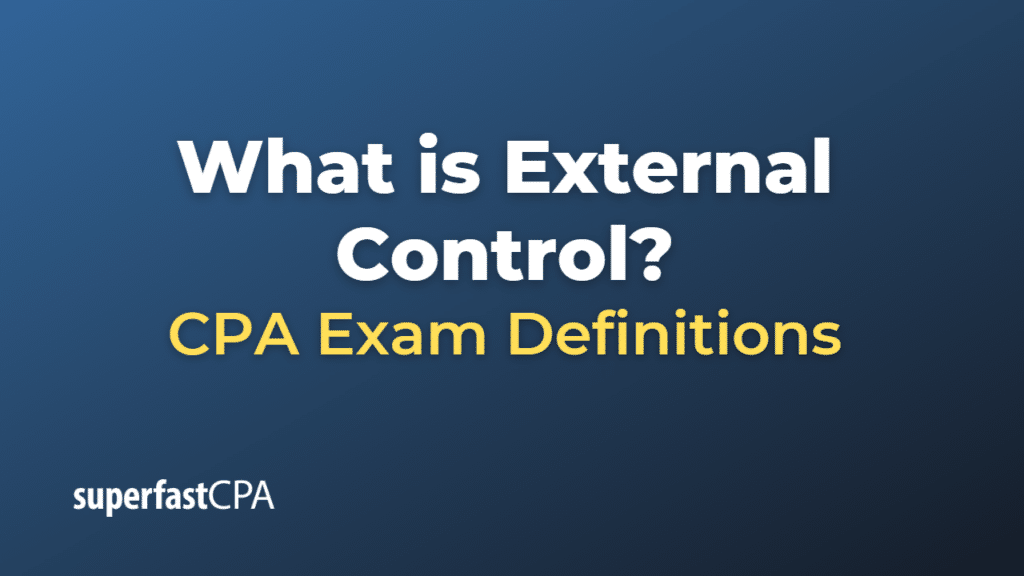External Control
External control refers to the mechanisms and practices outside an organization that influence its behavior and ensure its compliance with legal, ethical, and business standards. External control can come from various sources such as:
- Regulatory bodies and government agencies: These entities enforce laws, regulations, and industry standards. They can carry out inspections, audits, and issue penalties for non-compliance. Examples include the Securities and Exchange Commission (SEC) in the United States, which regulates publicly traded companies, and the Environmental Protection Agency (EPA), which enforces environmental regulations.
- External auditors: Independent auditors review the organization’s financial statements and accounting practices to verify their accuracy and compliance with accounting standards. Their audit reports provide an independent perspective on the company’s financial reporting integrity.
- Shareholders and Board of Directors: While the board is part of the company’s governance structure, it acts as an external control to the company’s management. The board, elected by shareholders, has the responsibility to oversee the company’s operations and strategic direction, and ensure management acts in the best interest of the shareholders.
- Customers and Suppliers: These stakeholders can exercise control through their buying or supplying decisions. For instance, customers may stop buying products from a company if they discover unethical practices, and suppliers may choose not to deal with a company that doesn’t comply with fair trade principles.
- Pressure Groups and Media: Public opinion, as shaped by media coverage and the activities of non-governmental organizations (NGOs) or pressure groups, can also exert control over a company. If a company engages in practices that are seen as harmful or unethical, these groups can put pressure on the company to change its ways.
These external controls help ensure transparency, ethical behavior, and accountability in an organization’s operations. They also help protect the interests of various stakeholders and the public at large.
Example of External Control
Let’s consider a pharmaceutical company called “HealthPlus Pharma” as an example.
- Regulatory bodies: In the United States, the Food and Drug Administration (FDA) is the primary regulatory body for pharmaceutical companies. The FDA controls the approval of new drugs that HealthPlus Pharma develops. They require the company to conduct extensive clinical trials and provide evidence of a drug’s safety and efficacy before it can be sold to the public.
- external auditors: HealthPlus Pharma is a publicly traded company, so it must have its financial statements audited annually by an independent external auditor. This auditor reviews HealthPlus Pharma’s financial records to ensure they comply with Generally Accepted Accounting Principles (GAAP), and that the financial statements provide a fair and accurate representation of the company’s financial condition.
- Shareholders and Board of Directors: HealthPlus Pharma’s board of directors, elected by shareholders, oversees the company’s management team. The board ensures that the CEO and other executives are making decisions that align with the company’s strategic objectives and enhance shareholder value. They also review and approve significant corporate actions, such as acquisitions or major investments.
- Customers and Suppliers: Hospitals and healthcare providers are major customers of HealthPlus Pharma. If the company’s products don’t meet their expectations for safety and efficacy, they might stop purchasing them. Similarly, suppliers of raw materials necessary for drug production could sever ties with HealthPlus if they find out the company engages in unethical business practices.
- Pressure Groups and Media: If HealthPlus Pharma were found to be testing its products unethically or causing environmental damage, it could face backlash from pressure groups and negative media coverage. This could harm its reputation and lead to lost sales, demonstrating the power of these external controls.
These various forms of external control help ensure that HealthPlus Pharma operates responsibly, complies with legal and ethical standards, and stays focused on creating value for its stakeholders.












